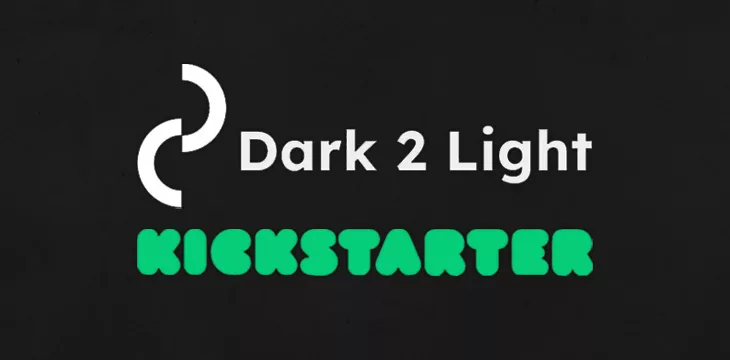|
Getting your Trinity Audio player ready...
|
I recently connected with Alexander Fauvel, the CEO of Dark2Light, a new card game utilizing the BSV blockchain. Fauvel told me all about the problem the game solves, how it works, what role BSV blockchain plays, and how you and I can get involved in its Kickstarter campaign. Check out the questions I asked and the Dark2Light CEO’s answers below.
To start things off, can you tell me more about the Dark2Light Kickstarter campaign?
Alex Fauvel: Kickstarter is a traditional crowdfunding platform where you can pre-order a product, and if it reaches its minimum funding goal, it is delivered. It is really for entrepreneurs who are just starting their business or getting enough orders to make production profitable.
In our case, you are pre-ordering our physical card game and getting beta access to the platform. The online beta will start on November 1, and the card game should be before Christmas.
We’ve just surpassed 2/3rds of our $4,000 goal and have about 18 of 31 days left. It finishes early on the morning of November 7, so if you don’t order before then, you will not be able to get a set this year.
Since the interview, Fauvel gave me an update: the Dark2Light Kickstarter has surpassed 100% of its goal, and so every reward for a contribution is an order that will be delivered before Christmas. Learn more about that on the Dark2Light Kickstarter page.
What’s the high-level overview of Dark2Light? How does it work? What would the process of playing online look like?
Alex Fauvel: Dark2Light is a card game interlinked with an online platform centered around funny, important, or strange Yes/No questions. We currently have the tagline “A Democracy Game” because, at every turn, everyone votes yes or no on the question someone picked from the deck.
Once everyone has voted, the reader guesses the result of the vote and gets points for being right. This rewards players who can read the people that they are playing with.
The expansion also punishes rule breakers with Drop cards. These cards have actions or dares on them; if these aren’t completed, the player loses points. In a sense, the game is like truth or dare, but during the truth, no one knows who said what, and during the dare, the easy escape is to just lose points.
The online platform gives you the ability to contribute your own questions to the card game. There are literally billions of queries and combinations of them. I think everyone once dreamed of a game that would be better if you could add special cards to it—something of your own. Dark2Light is a game where that is one of the core elements of the gameplay. Everyone has questions, and you never know where a good question is going to come from.
The online platform also allows you to vote on the question electronically using Bitcoin payments so that you are only able to see the result once you have voted yourself. Much like the card game, you don’t get a choice of voting or not, so it becomes like ‘Hot or Not’ as opposed to scrolling through a timeline.
If you want more in-depth data about how a question has been voted on, you can boost it for a fee. This fee pays the user who asked the question and pays to collect more votes for the question. We also have an economic reporting system, the details of which we will be experimenting with in our beta coming at the end of the month.
What inspired you to create the game, or put another way, what problem does it solve?
Alex Fauvel: The game solves the embarrassment of ‘asking stupid questions’ and, more importantly, honestly answering ‘stupid questions.’ When done in your own social circles, it is fun, fascinating, and surprising. When done at a global scale, it becomes imperative. Who gets to decide what questions are worth asking?
With Dark2Light, the requirement is you just have to put a little bit of thought into it and then pay a small fee to collect the data. Once that threshold is reached, it is up to the market to decide what questions are valuable and which are not simply by how they propagate throughout society.
Were there any challenges during the development of Dark2Light? What challenges did the BSV blockchain help you solve?
Alex Fauvel: The main challenge was getting people that I only met online to understand the power that this game has. If a few of us sit around a table and play the physical card game, you get it within five minutes. We have even given the game away as a free PDF on our website.
Very few people actually take the time to do this because it is not convenient, and they have made assumptions about how things will play out. These assumptions are normally wrong, and sometimes the only way to know is to just do it.
BSV blockchain helps with royalty payments for questions or data you have contributed, but also as a transparent audit trail of the votes. Our questions have a base fee of between $0.51 and $1.73, which is too small for most payment processors unless they are taking the lion’s share of the profit.
If we were to use only traditional payment methods, you would only be able to buy questions 10 or so at a time; using BSV blockchain allows us to sell each one individually and give the money that would be taken up by payment processors back to our users.
How does Dark2Light link back to the BSV blockchain? I heard you mention physical cards with QR codes linking back to the blockchain before. Can you expand on that?
Alex Fauvel: Each card has a QR code on it that will take users to that question on
dark2light.xyz. They can then vote on it and view the results of the vote. Each question can only be asked once, and once asked, it never expires.
The industry likes to call these kinds of systems NFTs. However, your question is confined to our platform, and we don’t have plans to allow transfers outside of it. It is more of an ‘internal token,’ which basically just means database entry.
We are using BSV blockchain for these so that our customers can be assured that our systems are as transparent as possible. After all, there is nothing more important to you than the voice that your vote gives you.
Why BSV blockchain specifically? Did you try any other blockchains? How did you come to learn about BSV blockchain and its technical capabilities?
Alex Fauvel: BSV blockchain is the only thing that works at scale and was released in a fair manner with all the required characteristics to be a stable money rail for the entire globe.
I learned about the technical capabilities by simply reading the white paper and watching the dynamics of how the protocol was being controlled through social (fake news) media over the past 10 years.
The assumption people have about Bitcoin is that it is about taking away the control of money from those in power. If that’s the case, then all the properties that make it money must not be controlled by anyone. This means you don’t vote on what money you use or how it should behave; using the money you want is the vote.
Are there, or will there be, any digital tokens or assets linked to dark2light that can be bought, sold, or traded on the BSV blockchain?
If we succeed in making question assets, then yes. We will never have a ticker token outside of a regulated securities market that would represent stock. Some businesses are better and more profitable if kept private.
If everything goes exactly as you hope, what will Dark2Light look like in five years?
We have elections every four years and tech companies that can become worth billions in around the same or less time. Let’s see how far asking questions can go.
Don’t forget about the Dark2Light Kickstarter!
Clearly, Fauvel and his team have come up with a unique way to utilize the BSV blockchain’s power in a fun, informative, and potentially massively popular way. Don’t forget to show your support by checking out the Dark2Light Kickstarter and backing the project.
To learn more about Dark2Light, watch Alexander Fauvel’s excellent interview with Kurt Wuckert Jr. on the CoinGeek Weekly Livestream!

 03-05-2026
03-05-2026 




